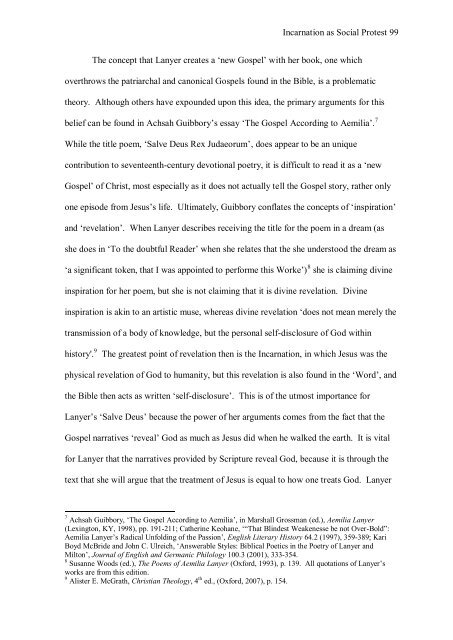Jesse Sharpe PhD thesis - Research@StAndrews:FullText ...
Jesse Sharpe PhD thesis - Research@StAndrews:FullText ...
Jesse Sharpe PhD thesis - Research@StAndrews:FullText ...
You also want an ePaper? Increase the reach of your titles
YUMPU automatically turns print PDFs into web optimized ePapers that Google loves.
Incarnation as Social Protest 99<br />
The concept that Lanyer creates a ‘new Gospel’ with her book, one which<br />
overthrows the patriarchal and canonical Gospels found in the Bible, is a problematic<br />
theory. Although others have expounded upon this idea, the primary arguments for this<br />
belief can be found in Achsah Guibbory’s essay ‘The Gospel According to Aemilia’. 7<br />
While the title poem, ‘Salve Deus Rex Judaeorum’, does appear to be an unique<br />
contribution to seventeenth-century devotional poetry, it is difficult to read it as a ‘new<br />
Gospel’ of Christ, most especially as it does not actually tell the Gospel story, rather only<br />
one episode from Jesus’s life. Ultimately, Guibbory conflates the concepts of ‘inspiration’<br />
and ‘revelation’. When Lanyer describes receiving the title for the poem in a dream (as<br />
she does in ‘To the doubtful Reader’ when she relates that the she understood the dream as<br />
‘a significant token, that I was appointed to performe this Worke’) 8 she is claiming divine<br />
inspiration for her poem, but she is not claiming that it is divine revelation. Divine<br />
inspiration is akin to an artistic muse, whereas divine revelation ‘does not mean merely the<br />
transmission of a body of knowledge, but the personal self-disclosure of God within<br />
history'. 9<br />
The greatest point of revelation then is the Incarnation, in which Jesus was the<br />
physical revelation of God to humanity, but this revelation is also found in the ‘Word’, and<br />
the Bible then acts as written ‘self-disclosure’. This is of the utmost importance for<br />
Lanyer’s ‘Salve Deus’ because the power of her arguments comes from the fact that the<br />
Gospel narratives ‘reveal’ God as much as Jesus did when he walked the earth. It is vital<br />
for Lanyer that the narratives provided by Scripture reveal God, because it is through the<br />
text that she will argue that the treatment of Jesus is equal to how one treats God. Lanyer<br />
7 Achsah Guibbory, ‘The Gospel According to Aemilia’, in Marshall Grossman (ed.), Aemilia Lanyer<br />
(Lexington, KY, 1998), pp. 191-211; Catherine Keohane, ‘“That Blindest Weakenesse be not Over-Bold”:<br />
Aemilia Lanyer’s Radical Unfolding of the Passion’, English Literary History 64.2 (1997), 359-389; Kari<br />
Boyd McBride and John C. Ulreich, ‘Answerable Styles: Biblical Poetics in the Poetry of Lanyer and<br />
Milton’, Journal of English and Germanic Philology 100.3 (2001), 333-354.<br />
8 Susanne Woods (ed.), The Poems of Aemilia Lanyer (Oxford, 1993), p. 139. All quotations of Lanyer’s<br />
works are from this edition.<br />
9 Alister E. McGrath, Christian Theology, 4 th ed., (Oxford, 2007), p. 154.
















